#deregulation
Text
At one campaign rally after another, former President Donald Trump whips his supporters into raucous cheers with a promise of what’s to come if he’s given another term in office: “We will demolish the deep state.”
In essence, it’s a declaration of war on the federal government—a vow to transform its size and scope and make it more beholden to Trump’s whims and worldview.
The former president’s statements, policy blueprints laid out by top officials in his first administration and interviews with allies show that Trump is poised to double down in a second term on executive orders that faltered, or those he was blocked from carrying out the first time around.
Trump seeks to sweep away civil service protections that have been in place for more than 140 years. He has said he’d make “every executive branch employee fireable by the president of the United States” at will. Even though more than 85% of federal employees already work outside the DC area, Trump says he would “drain the swamp” and move as many as 100,000 positions out of Washington. His plans would eliminate or dismantle entire departments.
A close look at his prior, fitful efforts shows how, in another term, Trump’s initiatives could debilitate large swaths of the federal government.
While Trump’s plans are embraced by his supporters, policy experts warn that they would hollow out and politicize the federal workforce, force out many of the most experienced and knowledgeable employees, and open the door to corruption and a spoils system of political patronage.
Take Trump’s statement on his campaign website: “I will immediately reissue my 2020 executive order restoring the president’s authority to remove rogue bureaucrats. And I will wield that power very aggressively.”
That executive order reclassified many civil service workers, whose jobs are nonpartisan and protected, as political appointees who could be fired at will. At the time, more than four dozen officials from ten Republican and Democratic presidential administrations, including some who served under Trump, condemned the order. In a joint letter, they warned it would “cause long-term damage to one of the key institutions of our government.”
In the end, Trump’s order had little impact because he issued it in the final months of his term, and President Joe Biden rescinded it as soon as he took office.
But if, as promised, Trump were to change thousands of civil service jobs into politically appointed positions at the start of a second term, huge numbers of federal workers could face being fired unless they put loyalty to Trump ahead of serving the public interest, warn policy experts.
‘AN ARMY OF SUCK-UPS’
“It’s a real threat to democracy,” Donald Moynihan, a professor of public policy at Georgetown University, told CNN. “This is something every citizen should be deeply aware of and worried about because it threatens their fundamental rights.”
Moynihan said making vast numbers of jobs subject to appointment based on political affiliation would amount to “absolutely the biggest change in the American public sector” since a merit-based civil service was created in 1883.
One of the architects of that plan for a Trump second term said as much in a video last year for the Heritage Foundation. “It’s going to be groundbreaking,” said Russell Vought, who served as the director of the Office of Management and Budget under Trump. He declined interview requests from CNN. But in the video, he spoke at length about the plan to crush what he called “the woke and the weaponized bureaucracy.” Vought discussed dismantling or remaking the Department of Justice, the FBI and the Environmental Protection Agency, among others.
Vought focused on a plan he drafted to reissue Trump’s 2020 executive order, known as Schedule F. It would reclassify as political appointees any federal workers deemed to have influence on policy. Reissuing Schedule F is part of a roadmap, known as Project 2025, drafted for a second Trump term by scores of conservative groups and published by the Heritage Foundation.
Vought argues the civil service change is necessary because the federal government “makes every decision on the basis of climate change extremism and on the basis of woke militancy where you’re effectively trying to divide the country into oppressors and the oppressed.”
A Trump campaign spokesperson pointed CNN to a pair of campaign statements from late last year in part responding to reporters’ questions about the 900-plus-page Project 2025 document. The campaign said, “None of these groups or individuals speak for President Trump or his campaign… Policy recommendations from external allies are just that – recommendations.” However, the Project 2025 recommendations largely follow what Trump has outlined in broad strokes in his campaign speeches – for example, his plans to reissue his 2020 executive order “on Day One.”
Ostensibly, a reissued Schedule F would affect only policy-making positions. But documents obtained by the National Treasury Employees Union and shared with CNN show that when Vought ran OMB under Trump, his list of positions to be reclassified under Schedule F included administrative assistants, office managers, IT workers and many other less senior positions.
NTEU President Doreen Greenwald told reporters at the union’s annual legislative conference that it estimated more than 50,000 workers would have been affected across all federal agencies. She said the OMB documents “stretched the definition of confidential or policy positions to the point of absurdity.”
Trump’s comments about wanting to be able to fire at will all executive-branch employees suggest the numbers in a second term would be far greater.
Moynihan, at Georgetown, said US policies already grant the president “many more political appointees than most other rich countries” allow – about 4,000 positions.
“Almost all Western democracies have a professional civil service that does not answer to whatever political party happens to be in power, but is immune from those sorts of partisan wranglings,” said Kenneth Baer, who served as a senior OMB official under President Barack Obama. “They bring… a technical expertise, a sense of long history and perspective to the work that the government needs to do.” Making thousands of additional positions subject to political change risks losing that expertise, while bringing in “people who are getting jobs just because they did some favor to the party, or the president was elected. And so, there’s a risk of corruption.”
Such concerns cross the political aisle. Robert Shea, a senior OMB official under George W. Bush, called himself a hugely conservative, loyal Republican. But hiring people based on personal political loyalties would produce “an army of suck-ups,” he said.
“It would change the nature of the federal bureaucracy,” to remove protections from senior civil servants, he said. “This would mean that if you told your boss that what he or she was proposing was illegal, impractical, [or] unwise that they could brand you disloyal and terminate you.”
Biden has moved to block such a move. On April 4, the Office of Personnel Management, which in effect is the human resources department for the federal government, adopted new rules meant to bar career civil service workers from being reclassified as political appointees or other types of at-will workers.
The new rules would not fully block reclassifying workers in a second Trump term. But they would create “speed bumps,” said Baer. “To repeal the regulation, there would have to be a lengthy period of proposed rulemaking, 90 days of comment,” and other steps that would have to be followed. “And then probably the litigation, after that.”
“PLACES FILLED WITH PATRIOTS”
While assailing “faceless bureaucrats,” Trump also has said he would move federal agencies from “the Washington Swamp… to places filled with patriots who love America.”
But when he tried such moves before, the effect was to drain know-how, talent and experience from those agencies. That’s what happened in 2019 when Trump moved the headquarters of the Bureau of Land Management to Grand Junction, Colorado, and two agencies within the Department of Agriculture to Kansas City.
“The vast bulk of (headquarters) employees left the agencies,” said Max Stier, president and chief executive of the Partnership for Public Service, a nonpartisan group that promotes serving in government. It led to the loss of “expertise that had been built up over decades,” he said. “It destroyed the agencies.”
A 2021 investigation by the Government Accountability Office found that the BLM move pushed out hundreds of the bureau’s most experienced employees, and sharply reduced diversity, with more than half of black employees in DC opting to quit or retire rather than move to Colorado. The GAO also concluded that the USDA’s decision to move its Economic Research Service (ERS) and the National Institute of Food and Agriculture (NIFA) to Kansas City was “not fully consistent with an evidence-based approach.”
The two USDA agencies do statistical research and analysis. The ERS focuses on areas including the well-being of farms, the effects of federal farm policies, food security and safety issues, the impacts of trade policies and global competition. NIFA funds programs to help American agriculture compete globally, protect food safety and promote nutrition, among other areas.
Verna Daniels had worked for the USDA for 32 years, most of them as an information specialist at the Economic Research Service, when she and her colleagues found out their agency was being relocated in October 2019.
“I really enjoyed my job. I worked extremely hard. I never missed a deadline,” Daniels said. She said the announcement left her in shock. “Everybody was afraid, and it was happening so fast… We were given three months to relocate to wherever it was or vacate the premises.” She quit rather than uproot her whole family. “It was heart-wrenching.”
The Trump administration said moving the USDA agencies would bring researchers closer to “stakeholders”– that is, farmers. Catherine Greene, an agricultural economist with 35 years at the USDA’s Economic Research Service, called the idea ridiculous. “Every state that surrounds Washington, DC, has farming… I grew up on a hundred-year-old farm in southwestern Virginia.”
“We’ve all dedicated our lives to looking at farming in America, to looking at food systems in America,” Greene said. “I think the goal was to uproot the agency in such a way that most people would have to move on, and most people did. It was highly predictable.”
The other relocated research agency, the National Institute for Food and Agriculture, had 394 employees at the beginning of the Trump administration, said Tom Bewick, acting vice president of the union local for NIFA. Trump imposed a hiring moratorium that left positions unfilled as people moved or retired. By the time the relocation to Kansas City was announced, NIFA was down to 270 employees. “Once it was announced they would move us, we were losing 10 to 20 people a week,” Bewick explained. “We had less than 70 people make the move.” Five years on, he said, “We still are not the same agency, and we’ll never be the same agency we were.”
The USDA said the move to Kansas City would save taxpayers $300 million over 15 years. But the GAO said that analysis didn’t account for the loss of experience and institutional knowledge, the cost of training new workers, reduced productivity and the disruption caused by the move. Including such costs, the Agricultural and Applied Economics Association estimated the move actually cost taxpayers between $83 million and $182 million.
Greene, at the Economic Research Service, retired rather than move. After Biden took office, the BLM and the two USDA agencies moved their headquarters back to Washington, but also kept open their offices in Grand Junction and Kansas City, respectively. Greene said she worries for federal workers who might face the same choice in a second Trump term. “They mean business,” she said. “They spent four years practicing, and they are ready to rock and roll.”
To Stier, at the Partnership for Public Service, there is a huge gap between the perception and the reality of the role that the civil service plays across the country. “We’ve been doing polling on trust in government, and when you tag on the words, government ‘in Washington, DC,’ the trust numbers crater,” he said.
USING THE GOVERNMENT TO GO AFTER ENEMIES
On the campaign trail, Trump has regularly claimed, without evidence, that Biden and the Department of Justice are stage-managing various prosecutions of him – including state-level indictments in New York over falsifying business records and in Georgia, on charges of election subversion. Trump has used that false claim to say it would justify him using the Justice Department to target his political enemies. He’s said that in a second term he’d appoint a special prosecutor to investigate Biden. He told Univision last year he could have others indicted if they challenged him politically.
Trump tried to use the Department of Justice in this fashion during his previous term, repeatedly telling aides he wanted prosecutors to indict political foes such as Hillary Clinton or former appointees he’d fired, such as former FBI Director James Comey. He also pushed then-Attorney General Bill Barr to falsely claim the 2020 election was corrupt, which Barr refused to do.
In that term, some senior officials at the White House and the Justice Department pushed back against pursuing baseless prosecutions. Their resistance followed a tradition holding that the Justice Department should largely operate independently, with the president setting broad policies but not intervening in specific criminal prosecutions.
But in a second term, Trump could upend that tradition with the help of acolytes such as Jeffrey Clark, a former Justice official who faces disbarment in DC and criminal charges in Georgia for trying to help overturn the 2020 election results. As Trump tried to hang onto the White House in his final weeks in office, he pushed to make Clark his acting attorney general, stopping only after senior Justice Department leaders threatened to resign en masse if he did so.
Last year, Clark published an essay titled “The U.S. Justice Department Is Not Independent” for the Center for Renewing America, a conservative nonprofit founded by Russell Vought. Clark also helped draft portions of the Project 2025 blueprint for a second Trump term, including outlining the use of the Insurrection Act of 1807 to deploy the military for domestic law enforcement, as first reported by the Washington Post.
Trump also has talked about bringing to heel other parts of the federal government.
“We will clean out all of the corrupt actors in our National Security and Intelligence apparatus, and there are plenty of them,” Trump said in a video last year. “The departments and agencies that have been weaponized will be completely overhauled so that faceless bureaucrats will never again be able to target and persecute conservatives, Christians, or the left’s political enemies.”
Project 2025’s blueprint envisions dismantling the Department of Homeland Security and the FBI; disarming the Environmental Protection Agency by loosening or eliminating emissions and climate-change regulations; eliminating the Departments of Education and Commerce in their entirety; and eliminating the independence of various commissions, including the Federal Communications Commission and the Federal Trade Commission.
The project includes a personnel database for potential hires in a second Trump administration. Trump’s campaign managers have not committed the former president to following the Project 2025 plans, should he win the White House. But given the active involvement of Trump officials in the project, from Vought and Clark to former Chief of Staff Mark Meadows, senior adviser Stephen Miller, Peter Navarro and many others, critics say it offers a worrisome roadmap to a second Trump term.
“Now they really understand how to use power, and want to use it to serve, not just Republican partisans, but Donald Trump,” said Baer.
On the campaign trail, Trump leaves little doubt about what he’ll try to do.
“We will put unelected bureaucrats back in their place,” Trump told his supporters at one rally last fall. “The threat from outside forces is far less sinister, dangerous and grave than the threat from within.”
#us politics#news#republicans#donald trump#conservatives#gop#2024#2024 elections#project 2025#deep state#civil service workers#political appointees#at will hires#at will employment#Russell Vought#Schedule F#Heritage Foundation#cnn#deregulation#Office of Personnel Management#Jeffrey Clark#partisanship#fascism
17 notes
·
View notes
Text
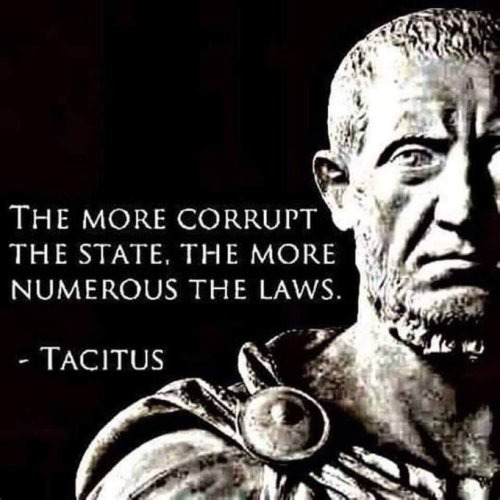
Truth
It's what I liked about #Trump's first presidency of "for every regulation we must add, we'll remove at least 2 that we don't need" status. That freaked everyone out. Why? Deregulation of BIG government is a good thing.
241 notes
·
View notes
Text


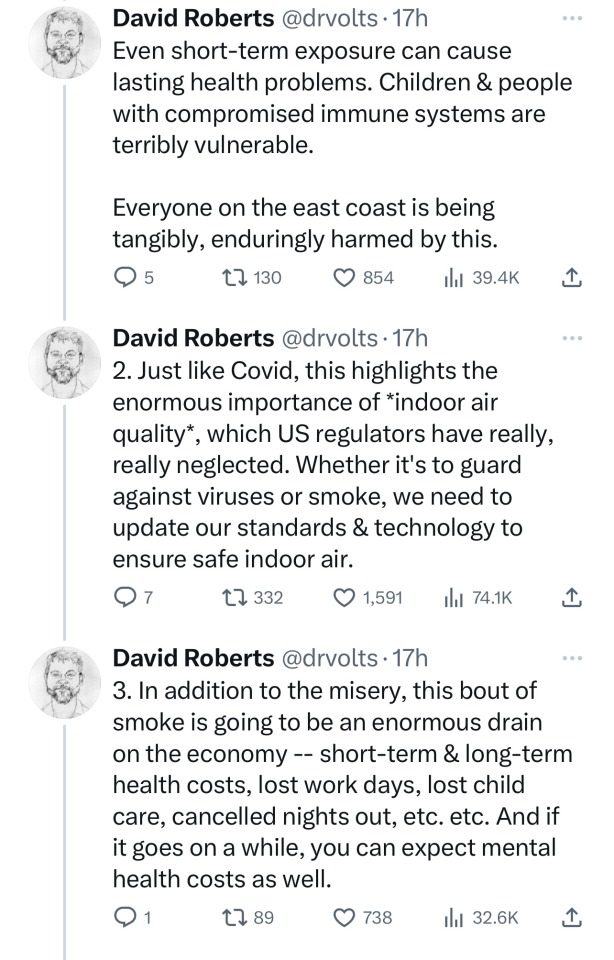
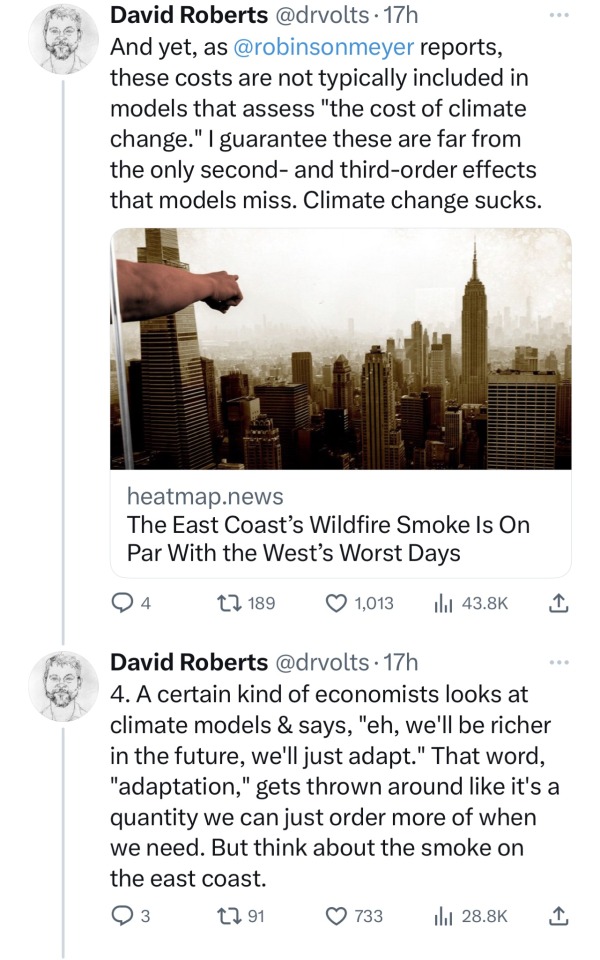


Whether you call it climate change or pollution, it’s still a series of policy decisions (deregulation). Deregulation that is disproportionately upheld by greedy corporations, red state Democrats, and is enforced overwhelmingly by Republican and Libertarian controlled legislatures.
(sources and other relevant links beneath the cut)
👉🏿 https://heatmap.news/climate/wildfire-smoke-east-air-quality
👉🏿 https://www.volts.wtf/p/volts-podcast-david-wallace-wells
👉🏿 https://threadreaderapp.com/thread/1666541345069219840.html
👉🏿 https://threadreaderapp.com/thread/1648986424098652160.html
#politics#republicans#pollution#climate change#environment#climate change deniers#deregulation#libertarians#smog#forest fires#nyc#climate catastrophe#climate crisis#forever chemicals#pfps
743 notes
·
View notes
Text

#us politics#lolbertarians#taxation is theft and other lies by lolbertarians#fuck libertarians#libertarians be like#libertarians#conservatives#memes#shitpost#bootlickers#freedom of movement#bodily autonomy#nationalistic trade policies#political violence#fascist police state#deregulation#deregulate deez nutz#corporate monopolies#privatization#property rights
489 notes
·
View notes
Text
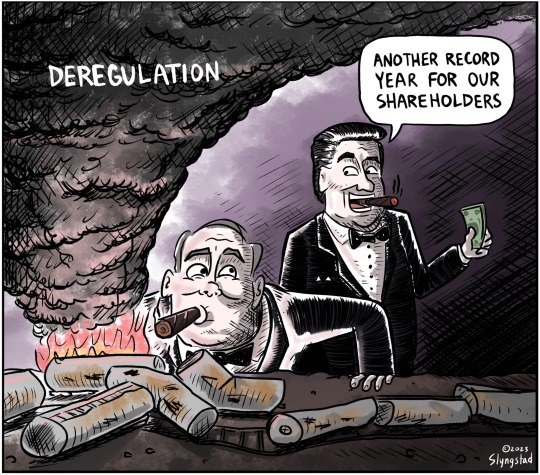
98 notes
·
View notes
Video
poverty and capitalism
#tiktok#capitalism is a scam#new deal#poverty#living wage#minimum wage#wages and salaries#livable wage#wages#1300s#histroy#industrial revolution#the great depression#the panic of 1873#deregulation#regulations#economy#economics#great recession
142 notes
·
View notes
Text
44 notes
·
View notes
Text
youtube
Billionaires are pillaging America. How do we fight back? | The Chris Hedges Report
The resurgence of the labor movement in 2023 galvanized and emboldened unions around the country—and sent capitalists scrambling to squash the nascent militancy of their workers. Among the attempts of the billionaire class to retaliate is a major legal challenge to the National Labor Relations Board, the government body that has protected the right of workers to collective bargaining for 89 years. This latest attack on the rights of workers is the culmination of a decades-long assault on the working class in the US, which has been caught between an economic system hemorrhaging jobs and a political system that refuses to address their problems. Les Leopold, executive director of the Labor Institute and author of Wall Street's War on Workers, joins The Chris Hedges Report to discuss the full-spectrum assault on worker power taking place before our eyes.
#capitalism#crisis of legitimacy#billionaires#class war#unions#Amazon#starbucks#trader joes#nlrb#plutocracy#corporate state#Youtube#democrats#republicans#neoliberalism#deregulation#oligarchy#chris hedges
12 notes
·
View notes
Text
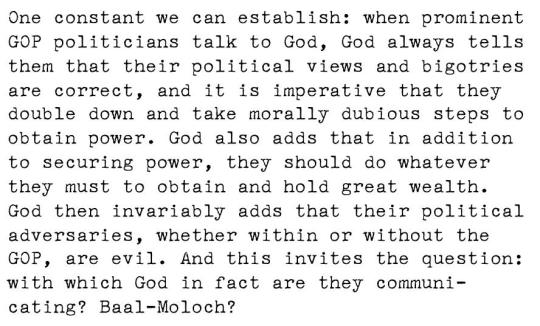
LETTERS FROM AN AMERICAN
April 13, 2024
HEATHER COX RICHARDSON
APR 14, 2024
There are really two major Republican political stories dominating the news these days. The more obvious of the two is the attempt by former president Donald Trump and his followers to destroy American democracy. The other story is older, the one that led to Trump but that stands at least a bit apart from him. It is the story of a national shift away from the supply-side ideology of Reagan Republicans toward an embrace of the idea that the government should hold the playing field among all Americans level.
While these two stories are related, they are not the same.
For forty years, between 1981, when Republican Ronald Reagan took office, and 2021, when Democrat Joe Biden did, the Republicans operated under the theory that the best way to run the country was for the government to stay out of the way of market forces. The idea was that if individuals could accumulate as much money as possible, they would invest more efficiently in the economy than they could if the government regulated business or levied taxes to invest in public infrastructure and public education. The growing economy would result in higher tax revenues, enabling Americans to have both low taxes and government services, and prosperity would spread to everyone.
But the system never worked as promised. Instead, during that 40-year period, Republicans passed massive tax cuts under Reagan, George W. Bush, and Trump, and slashed regulations. A new interpretation of antitrust laws articulated by Robert Bork in the 1980s permitted dramatic consolidation of corporations, while membership in labor unions declined. The result was that as much as $50 trillion moved upward from the bottom 90% of Americans to the top 1%.
To keep voters on board the program that was hollowing out the middle class, Republicans emphasized culture wars, hitting hard on racism and sexism by claiming that taxes were designed by Democrats to give undeserving minorities and women government handouts and promising their evangelical voters they would overturn the Supreme Court’s 1973 Roe v. Wade decision recognizing the constitutional right to abortion. Those looking for tax cuts and business deregulation depended on culture warriors and white evangelicals to provide the votes to keep them in power.
But the election of Democrat Barack Obama in 2008 proved that Republican arguments were no longer effective enough to elect Republican presidents. So in 2010, with the Citizens United v. Federal Elections Commission decision, the Supreme Court freed corporations to pour unlimited money into U.S. elections. That year, under Operation REDMAP, Republicans worked to dominate state legislatures so they could control redistricting under the 2010 census, yielding extreme partisan gerrymanders that gave Republicans disproportionate control. In 2013 the Supreme Court’s Shelby County v. Holder decision greenlighted the voter suppression Republicans had been working on since 1986.
Even so, by 2016 it was not at all clear that the cultural threats, gerrymandering, and voter suppression would be enough to elect a Republican president. People forget it now because of all that has come since, but in 2016, Trump offered not only the racism and sexism Republicans had served up for decades, but also a more moderate economic program than any other Republican running that year. He called for closing the loopholes that permitted wealthy Americans to evade taxes, cheaper and better healthcare than the Democrats had provided with the Affordable Care Act (also known as Obamacare), bringing manufacturing back to the U.S., and addressing the long backlog of necessary repairs to our roads and bridges through an infrastructure bill.
But once in office, Trump threw economic populism overboard and resurrected the Republican emphasis on tax cuts and deregulation. His signature law was the 2017 tax cuts for corporations and the wealthy at a cost of at least $1.9 trillion over ten years. At the same time, Trump continued to feed his base with racism and sexism, and after the Unite the Right rally at Charlottesville, Virginia, in August 2017, he increasingly turned to his white nationalist base to shore up his power. On January 6, 2021, he used that base to try to overturn the results of the 2020 presidential election.
Republican senators then declined to convict Trump of that attempt in his second impeachment trial, apparently hoping he would go away. Instead, their acquiescence in his behavior has enabled him to continue to push the Big Lie that he won the 2020 election. But to return to power, Trump has increasingly turned away from establishment Republicans and has instead turned the party over to its culture war and Christian nationalist foot soldiers. Now Trump has taken over the Republican National Committee itself, and his supporters threaten to turn the nation over to the culture warriors who care far more about their ideology than they do about tax cuts or deregulation.
The extremism of Trump’s base is hugely unpopular among general voters. Most significantly, Trump catered to his white evangelical base by appointing Supreme Court justices who would overturn Roe v. Wade, and in 2022, when the court did so, the dog caught the car. Americans overwhelmingly support reproductive freedoms, and Republicans are getting hammered over the extreme abortion bans now operative in Republican-dominated states. Now Trump and a number of Republicans have tried to back away from their antiabortion positions, infuriating antiabortion activists.
It is hard to see how the Republican Party can appeal to both Trump’s base and general voters at the same time.
That split dramatically weakens Trump politically while he is in an increasingly precarious position personally. He will, of course, go on trial on Monday, April 15, for alleged crimes committed as he interfered in the 2016 election. At the same time, the $175 million appeals bond he posted to cover the judgment in his business fraud trial has been questioned and must be justified by April 14. The court has scheduled a hearing on the bond for April 22. And his performance at rallies and private events has been unstable.
He seems a shaky reed on which to hang a political party, especially as his MAGA Republicans have proven unable to manage the House of Representatives and are increasingly being called out as Russian puppets for their attacks on Ukraine aid.
Regardless of Trump’s future, though, the Reagan Era is over.
President Biden and Vice President Kamala Harris have quite deliberately rejected the economic ideology that concentrated wealth among the 1%. On their watch, the federal government has worked to put money into the hands of ordinary Americans rather than the very wealthy. With Democrats and on occasion a few Republicans, they have passed legislation to support families, dedicate resources to making sure people with student debt are receiving the correct terms of their loans (thus relieving significant numbers of Americans), and invested in manufacturing, infrastructure, and addressing climate change. They have also supported unions and returned to an older definition of antitrust law, suing Microsoft, Amazon, and Apple and allowing the federal government to negotiate with pharmaceutical companies over drug prices.
Their system has worked. Under Biden and Harris the U.S. has had unemployment rates under 4% for 26 months, the longest streak since the 1960s. Wages for the bottom 80% of Americans have risen faster than inflation, chipping away at the huge disparity between the rich and the poor that the policies of the past 40 years have produced.
Today, in an interview with Jamie Kitman of The Guardian, United Auto Workers president Shawn Fain, who negotiated landmark new union contracts with the country’s Big Three automakers, explained that the world has changed: “Workers have realized they’ve been getting screwed for decades, and they’re fed up.”
LETTERS FROM AN AMERICAN
HEATHER COX RICHARDSON
#GOP#Letters From An American#Heather Cox Richardson#UAW#the economy#history#income inequality#culture wars#trickle down#supply side#deregulation#white nationalism#tax cuts
6 notes
·
View notes
Text
THIS IS WHAT #DEREGULATION & #REPUBLICON #SENATORS #TedCRUZ & #GOVERNORS #GregABBOTT GIVE YOU.
DOWN BALLOT ELECTIONS MATTER.
"Xcel Energy facilities “appear to have been involved in an ignition” of a giant wildfire that’s been blazing across the Texas Panhandle since last month, the company said in a statement Thursday. The utility did not provide additional details on how it came to the determination, but said it was based on “currently available information.”
“Xcel Energy disputes claims that it acted negligently in maintaining and operating its infrastructure; however, we encourage people who had property destroyed by or livestock lost in the Smokehouse Creek fire to submit a claim to Xcel Energy through our claims process,” the statement said.
The Texas A&M Forest Service said Thursday investigators determined the Smokehouse Creek Fire - the biggest in state history, burning well over 1 million acres - and the Windy Deuce Fire were caused by power lines.
The forest service did not say whether the power lines that ignited the fires belonged to Xcel Energy.
The ongoing Smokehouse Creek Fire is the largest blaze in state history, burning more than 1,059,570 acres, according to the forest service. Two people have been killed in the blaze and authorities estimate 500 structures have been destroyed as a result."
6 notes
·
View notes
Text
They just put four more people up on the space station. We used to use Russia to supply the space station. Now we're using SpaceX.
And the problem is that the Ukrainian Army also uses SpaceX for their frontline battle communications. It costs, according to Ronan Farrow, $400 million a year. Initially, I remember when Elon said, I'll give it to you for free. But then Elon calls the Defense Department, and says, “Hey, this is killing me here. You got to pay up.”
The threat being that he would disconnect frontline forces from their comms and in effect, end the war.
And so the Department of Defense is handling Elon with kid gloves.
I think the issue that this raises is it's far more disturbing than just not having an invoice. During the Obama administration, Russia illegally annexed Crimea, which is a part of Ukraine. And now the current war going on is a continuation of that, where Vladimir Putin is trying to take over the rest of Ukraine, right?
So what happens is those telecommunications are geofenced. So as soon as they cross that border, Ukrainians cross the border into their own territory. Elon Musk has decided they are not going to have frontline communication, meaning battlefield commanders cannot order strikes or pass intelligence back and forth.
We've had network-centric warfare for the last 20 years, which really puts that kind of total intelligence environment, like our warfare is based around that.
Where are the targets?
Where do we send cruise missiles?
Where do we send drones to?
And Elon Musk is really in this position because we have chosen to basically defund NASA and to not play a role in putting this telecommunications equipment into space ourselves, and now this billionaire gets to decide who wins and loses this war.
He literally could throw the war to Russia just by turning off SpaceX for Ukrainian forces.
And what is even more troubling, and Ronan Farrow puts this out in the piece, is there are very valid concerns about Musk's relationship with Putin.
I personally found his talking points on Crimea really disturbing because they are word for word repeating Russian propaganda straight from the Kremlin.
In this article, they quote Musk talking to a Defense Department official. “Well, I had this great conversation with Putin,” says Musk.
Yeah, that doesn't seem like a good thing. There's a throughput through all of this, where America's government decides to underinvest in a certain industry, right? Whether it's electric cars, or telecommunications equipment, or space infrastructure, or all of these things. Musk moves into the space and creates a company that kind of creates a near monopoly.
This is exactly why we've had to move to electric car companies using the Tesla standard. Elon has built all the infrastructure nationwide for charging, Audi has tried with Electrify America and failed miserably.
So what happens?
Car companies say, yeah, we're going to start using the Tesla standard because that's the only charging network out there. So it's bad enough when a billionaire can decide, like, fine, “That's the free market,” or some version of the free market. Well, that’s a whole ‘nother discussion.
But if you're talking about national security concerns, I've got real big problem with Elon Musk being the veto over if Ukraine can take back their own country.
And remember, Musk has other incentives besides the good of the Ukrainian people, or of America.
For instance, half of all Teslas are made in China. In Shanghai, Farrow says when Musk went to China, he was treated like a visiting celebrity with flattery and feasts. He met with senior officials, including China's foreign minister, posed for photos, the awkwardly smiling, formal photos that are more typical of world leaders.
Now, partly this is because of a vacuum created by American politics, believing in the free market as opposed to government investment, but partly it's because of Elon's, I guess you could say, business acumen, moving into those arenas. I mean, you can’t blame him for building a very successful business in the absence of government investment, but at this point, at this point, he's got us over a barrel.
And his motives, again, may not just be what's best for America, or what's best even for Ukraine. It's what's best for Elon.
—BRIANNA WU and friends discussing “Elon Musk's Shadow Rule” by Ronan Farrow
151 notes
·
View notes
Text

#pro life#entitlements#us politics#religions#organized religion#jesus christ#Republicans#conservatives#gop#evangelicalism#evangelical christianity#radical christianity#simping for capitalism#libertarians#deregulation#eye for an eye#anti immigration#memes#shitpost
90 notes
·
View notes
Text
I've thought about it and I believe laws are a substitute for a healthy society.
Laws, enforced by some kind of authority, are necessary as long as we live in an unhealthy society. But we shouldn't rely on them, we should strive to heal society instead.
For example, laws against child abuse are only essential in a society in which:
punishment, even physical punishment, is culturally acceptable and even encouraged;
in which gerontocracy (the authority of the old over the young) is upheld as something natural and sacred;
and which shuns and discourages all models of child-rearing and family organization that defy the nuclear family (in which a child is raised by their parents only, and not by the community, therefore allowing parents to essentially treat their children as personal property rather than as human members of society).
If we focused on creating a healthier society, those laws against child abuse would become obsolete, as even in cases in which some form of abuse may happen, wider society would be equipped to deal with it. And the child would participate in that effort.
@ AnCaps now:
capitalism wasn't designed to create a healthy and stable society. Even if we're very generous, capitalism puts "the best at the top" (...) and creates hierarchies and inequality—in fact it relies on material inequality to function, as the Phillips Curve and the state of the world demonstrate. There is no way it's moral or rational for billionaires and homeless people to exist in the same country but they do and that's intentional.
How does that relate to the rest of the post?
Well, laws are necessary to reduce harm and injustice as long as a society is unhealthy. Capitalism creates and relies on an unhealthy society. Therefore, as long as we have capitalism, it needs to be regulated and we need laws and a state—that's for everyone's sake. If you are genuinely an anti-authoritarian, and you genuinely don't want to cause harm and injustice, you must oppose capitalism as well as laws and the state.
Otherwise what you're advocating for isn't anarchism, it is privatized authoritarianism.
#anarchism#anarchocapitalism#capitalism#anti capitalism#the state#deregulation#libertarian#libertarianism#libertarian socialism#society#future#anarchocommunism#socialism#interesting#individualism#collectivism#nuclear family#gadsden#revolution#communism#economy#marxism#legality
220 notes
·
View notes
Video
Indiana plastics fire spewed toxic chemicals, EPA tests find, including benzene and hydrogen cyanide
https://www.nbcnews.com/news/us-news/indiana-plastics-fire-spewed-toxic-chemicals-epa-finds-benzene-rcna79778
The EPA said Thursday that it also found asbestos in samples of debris that fell in surrounding neighborhoods up to 1.5 miles from the fire. Asbestos can cause several types of cancer, including mesothelioma and lung, laryngeal and ovarian cancer. No amount of exposure is considered safe, according to the Occupational Safety and Health Administration.
#tiktok#Indiana plastics fire#air pollution#pollution#EPA#asbestos#capitalism is violence#rustbest#midwest#corruption#deregulation#regulations
37 notes
·
View notes
Text
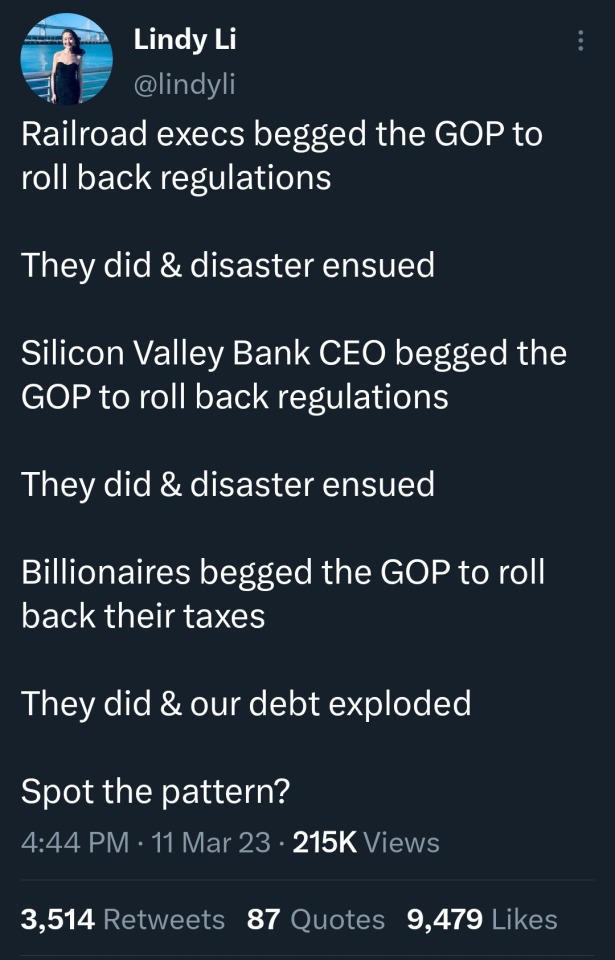
See the pattern?
35 notes
·
View notes